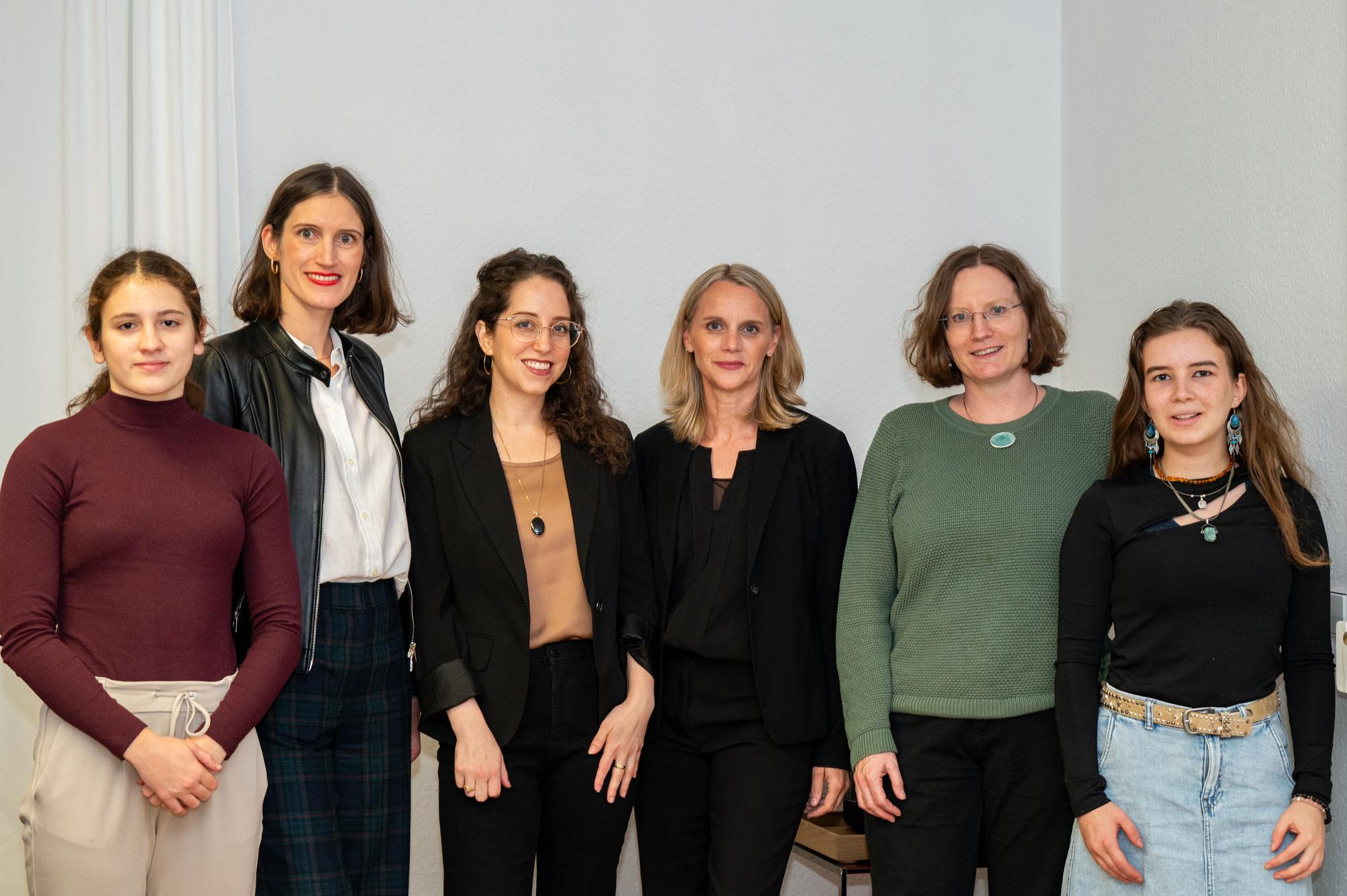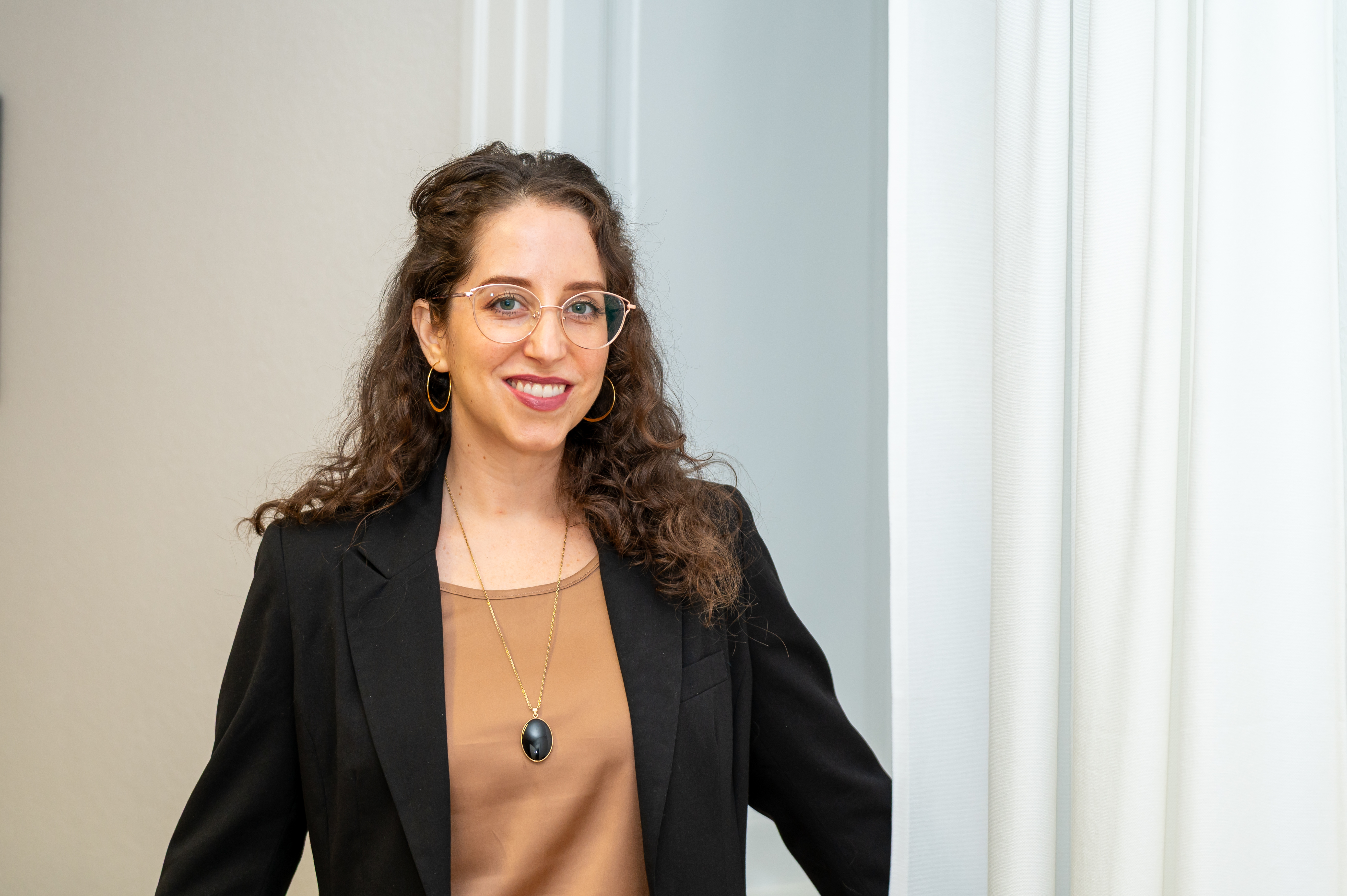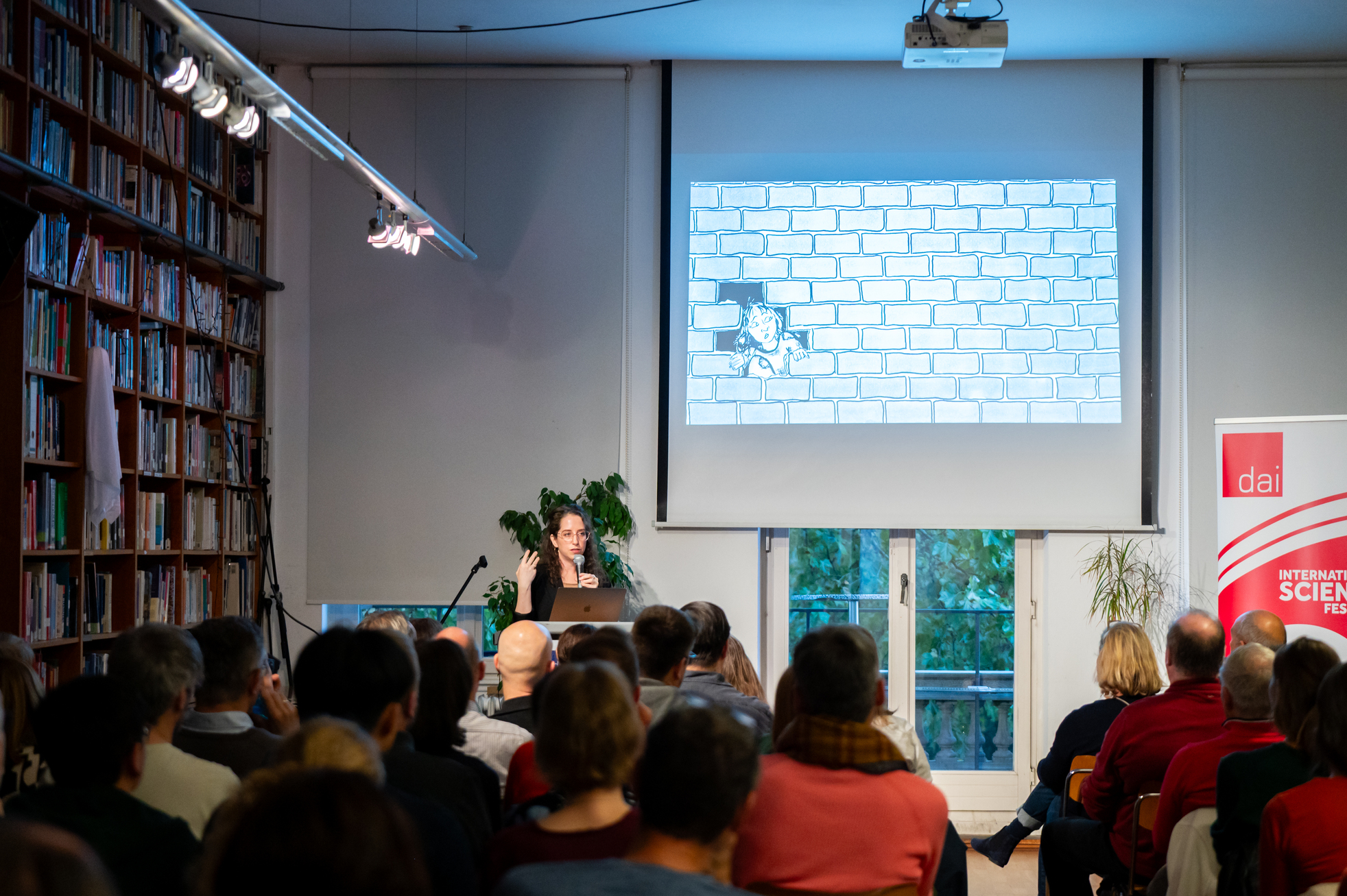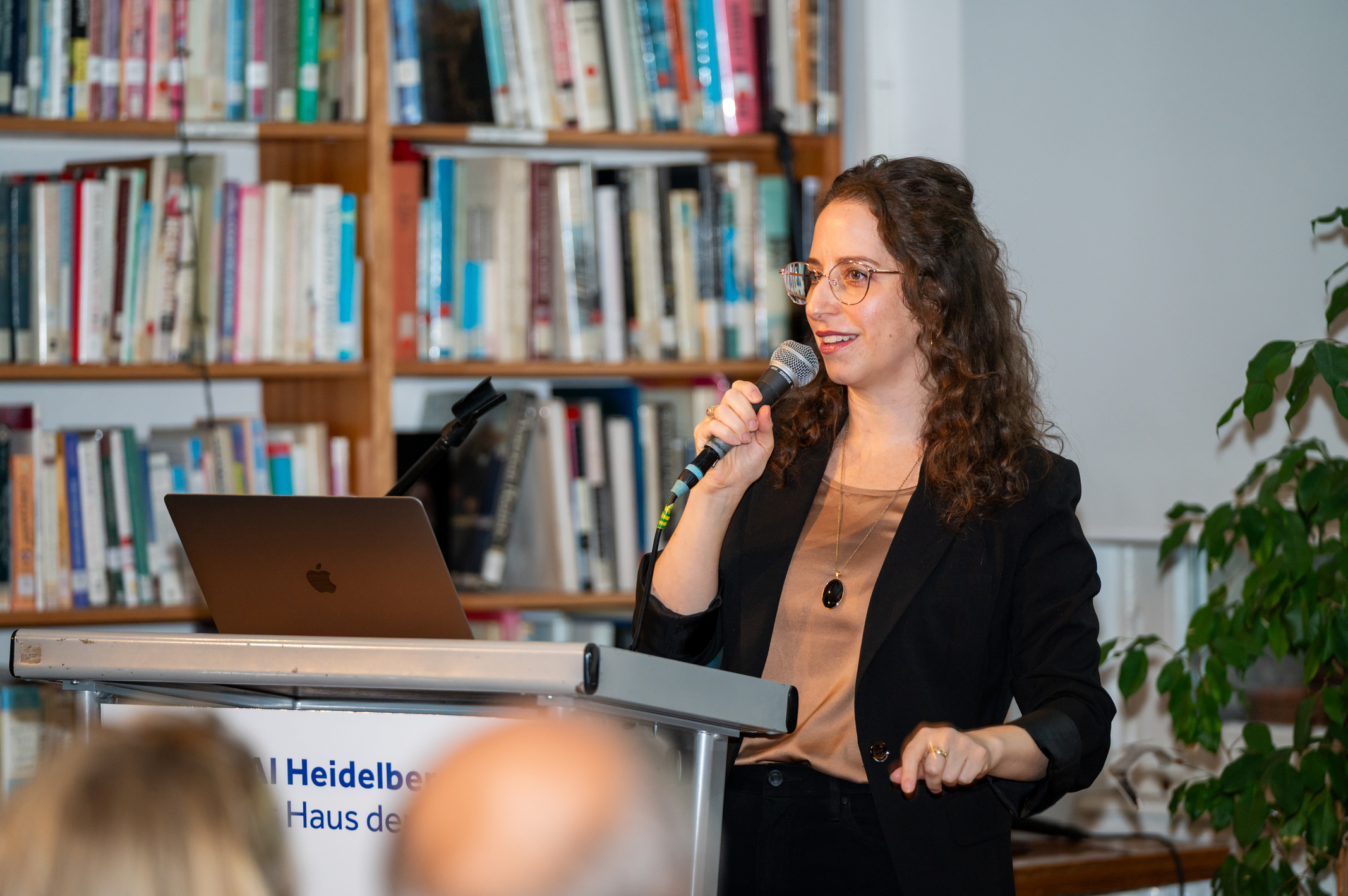To Capture Things How They Feel: An Interview with Amy Kurzweil
After Amy Kurzweil´s lecture on her work and on her new book Artificial – mit KI zur Unsterblichkeit, we joined her and the director of the DAI, Lena Jöhnk, on the stage of the library. In this wonderful interview, the cartoonist and writer talks about her creative process and what inspires her work. She shares insights on art, storytelling, and how technology shapes her imagination.

Lena Jöhnk: I'm very happy to sit here together with our two Heidelberger Literaturscouts Sarah und Annemarie. They both read Amy Kurzweil´s book and are super prepared. They belong to this amazing group of youngsters who read different types of literature, go to events, and spread the excitement for literature. Exactly what we very much like here at the DAI! It's now the third time that we are doing something together with the Heidelberger Literaturscouts. The other two times have been amazing. Last time I joked, if they continue like this, I will lose my job. So thank you very much for being here. What is your first question to Amy Kurzweil?
Sarah : Ms. Kurzweil, are you still chatting with the FredBot - the bot you conceived from your grandfather´s documents - and if yes, for what reasons are you writing to him?
Amy Kurzweil: That's a great question. I'm really not chatting with the bot very regularly. I wanted the experience of being part of building it and then writing about it and I wanted to spend time with the documents. It's much more about the process than it is about the final product. That's sort of the secret of the arts (laughs) - I've never read my own book.

For me, the experience of being a part of building the dataset was what I wanted out of this FredBot experience. I have played around with new technologies, for example I gave the dataset to Notebook LM and I've put the dataset in the context window of ChatGPT because I'm interested in different ways that we can use generative AI with this kind of project. This has been an interesting experiment.
But the FredBot is not like an app on my phone that I turn to when I miss my grandfather. I think there are people that are using AI in that way, and I'm actually very interested in those experiences philosophically. But for me, it was really this creative experience that I wanted out of the process.
Annemarie: Are there any artists or writers who inspired you either in your writing or your visual style?
Amy Kurzweil: Yeah. So many! We're here in the DAI library and the graphic novel section is right over there… I saw that you have Blankets by Craig Thompson, which is a really lovely graphic memoir. I didn't have a lot of formal training in visual arts, and I learned to draw by imitating other artists. And Craig Thompson is one of the artists I imitated. I would just copy his drawings in my sketchbook. I really love artists that use brushes, I'm drawn to that expressive style.
Another artist that I really admire is Alison Bechdel, a graphic memoirist who's written books about both of her parents. I sort of modeled myself as a graphic memoirist in her image. My first book was about my mother and her parents, and then my second book is about my father and his parents. What I love about Alison Bechdel´s graphic memoir work is that she's super intellectual. And she was the first graphic memoirist that showed me that you don't need to be afraid to reference really big ideas in a comic.
Of course, the first graphic memoir that also showed me that it's okay to reference really, really serious topics with humor was Maus by Art Spiegelman, one of the more famous graphic memoirs. It was actually that book that led me on my path to writing my first book. I read the book when I was in college, and I immediately thought of my grandmother. The grandmother that I knew was so funny and so exuberant, such a character. And in Maus, there's a character who's a Holocaust survivor and he really reminded me of my grandmother. He's really funny but also has some negative aspects, like the ways in which his trauma makes him not quite fit into modern life. I really experienced that with my grandmother and when I saw that done in Maus, I was inspired to do something similar in my book, but to take it into the next generation.
These three influences were really important to me.
Sarah: What do you find special about the process of creating a cartoon or a graphic novel and how does this process work for you?
Amy Kurzweil: I love that question. Thank you. Your questions are so good. The first thing I love about comics is drawing and drawing where you are not trying to capture things how they look. You're trying to capture things how they feel. So you can take all the pressure of being a "good artist" out of the picture, which was a relief for me. When I first started drawing, I was really not impressed with my work (laughs).
What I could do was render expressions and render emotion. I also have a background as a dancer. So I was a writer and dancer and then when I got to drawing, I realized that you could capture so much physicality in just a line. When I learned that and understood that I could capture movement and expression and emotion with really simple lines, I was enchanted with how that could serve my stories.
Because with my writing, I'm quite wordy, and I sometimes get in my own way, and I make things overly complicated. Drawing allows me to just get to the heart of the emotional tenor while keeping all the ideas in there. I love that about comics.
Something else I really love about comics is the minimalism of comic storytelling. The concept comes from a book called Understanding Comics by Scott McCloud, and the concept is called closure. Closure is this phenomenon of hallucinating onto blank space. So, when there's white space on a page, you kind of fill in the gaps and you knit things together to create your own story. That's part of what makes comics so engaging and so active to read. You have to work hard in your minds to create full worlds in your head, in a particular way that is not quite linear the way reading a prose book is.
That's the third reason why comics are really special: it´s the way that you get to think in this non-linear way. You're thinking about putting things on the page as a kind of collage and that's sort of like how memory works. Memory is very associative. A comic page can be really associative and take you in all kinds of interesting directions. And I just love how the comic page can be a space of that sort of creativity and freedom. It also fits very well with stories about memory and stories about the past. If anyone wants to create comics with me on the internet, you can find me, and we'll draw together.
Annemarie: Was there a moment during your research or writing process that emotionally surprised or deeply moved you?

Amy Kurzweil: Another really great question. I think in general, the moments that stick with me are these feelings of being overwhelmed by the infinity of life and identity.
I know that's a very abstract answer, but it feels like the truest thing that came out of this book for me. As you can see, it's quite a large book and there's a lot of detail, and it took seven years, and I was just very moved by thinking about, as a case study, my grandfather's life and how much infinite detail there is to his life, and that I could just never capture it all.
I had that feeling about a lot of the different characters in the book. I would often just feel like I was constantly thinking about what I wanted to write down to remember to put in my book, and that became like a kind of compulsive thing that was happening in my mind as I was working on this book. And then eventually I realized it's not possible to capture people fully. What matters is your orientation towards them and coming to this kind of loving gaze and then trusting yourself to find the right details that can create a portrait of them.
Sarah : What do you think your grandfather would say if he'd known that there's a chatbot version of him and did you ask this question to the chatbot?
Amy Kurzweil: In the book, you can see there's a scene where I ask the chatbot, "What do you think of modern technology?" It was very interesting to see that I got totally different answers to that question. One was like about how automation makes man feel small and then another answer that he gave was about how he feels like innovators are never understood in their time. The answers I got supported a multiplicity of perspectives on technology.
But I never got to ask the chatbot specifically "How do you feel about being a chatbot?" The answer would, of course, be something I have to interpret. It would never give me the answer to what my grandfather would actually say. And so, I have to just imagine what he would say.
I think that he'd probably like that he's getting all this attention. (laughs) You know, he was a performer, and he liked being on stage, although he was actually very shy, but I don't think those things are incompatible actually. I think in some sense, he would like the attention. But he mostly wanted to be known for his music. I think he would be disappointed in the aspect of the chatbot that it was not featuring his music.
Annemarie: And now our last question. If someone were to digitally reconstruct you one day, what would you hope they would read or discover about you?

Amy Kurzweil: That's so great. Those of us who are artists, we think about legacy. We think about wanting to leave behind our perspective. It's not so much like some proposition or fact about me that I would want to live on, but I would want my perspective to be preserved.
If there were a digitization of me, my hope is that it would draw your attention to my books. What´s really useful about this AI is that it might direct our attention to the original source material that the person actually touched. I just hope that when I'm digitized (laughs) that those things won't be lost. When I look at my drawings, it's like looking at a child or something. It feels like something that I created, that I have a lot of fondness for. I feel like that's kind of what I want to live on, whatever I'm capturing about myself and how I see the world and the little expressions I put on people.
Lena Jöhnk: Thank you so much and thank you, Annemarie and thank you, Sarah, for these brilliant questions.
Sarah/Annemarie: Thank you for these very interesting answers and for giving us the opportunity to be a part of this event at the DAI.

To read the original interview by Sarah and Annemarie, Heidelberger Literaturscouts, please click here!
The Book:
Amy Kurzweil
Artificial – Mit KI zur Unsterblickeit?
Eine Familiengeschichte
Verlagshaus Jacoby & Stuart 2024
ISBN 978-3964282422
Posted in
Partners
.png)



.jpg)
